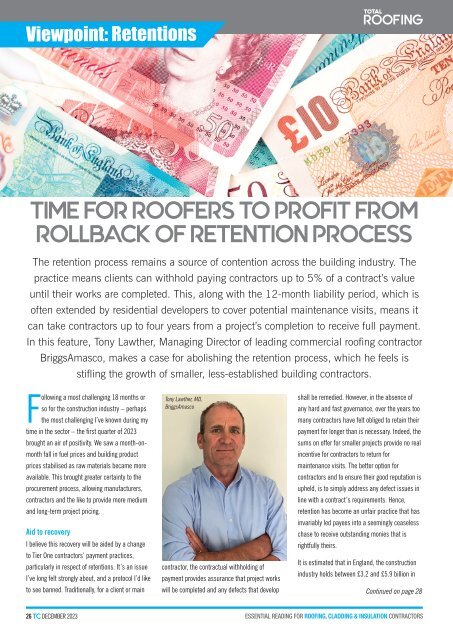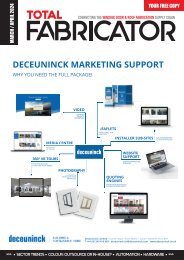December 2023
You also want an ePaper? Increase the reach of your titles
YUMPU automatically turns print PDFs into web optimized ePapers that Google loves.
Viewpoint: Retentions<br />
TIME FOR ROOFERS TO PROFIT FROM<br />
ROLLBACK OF RETENTION PROCESS<br />
The retention process remains a source of contention across the building industry. The<br />
practice means clients can withhold paying contractors up to 5% of a contract’s value<br />
until their works are completed. This, along with the 12-month liability period, which is<br />
often extended by residential developers to cover potential maintenance visits, means it<br />
can take contractors up to four years from a project’s completion to receive full payment.<br />
In this feature, Tony Lawther, Managing Director of leading commercial roofing contractor<br />
BriggsAmasco, makes a case for abolishing the retention process, which he feels is<br />
stifling the growth of smaller, less-established building contractors.<br />
Following a most challenging 18 months or<br />
so for the construction industry – perhaps<br />
the most challenging I’ve known during my<br />
time in the sector – the first quarter of <strong>2023</strong><br />
brought an air of positivity. We saw a month-onmonth<br />
fall in fuel prices and building product<br />
prices stabilised as raw materials became more<br />
available. This brought greater certainty to the<br />
procurement process, allowing manufacturers,<br />
contractors and the like to provide more medium<br />
and long-term project pricing.<br />
Aid to recovery<br />
I believe this recovery will be aided by a change<br />
to Tier One contractors’ payment practices,<br />
particularly in respect of retentions. It’s an issue<br />
I’ve long felt strongly about, and a protocol I’d like<br />
to see banned. Traditionally, for a client or main<br />
Tony Lawther, MD,<br />
BriggsAmasco<br />
contractor, the contractual withholding of<br />
payment provides assurance that project works<br />
will be completed and any defects that develop<br />
shall be remedied. However, in the absence of<br />
any hard and fast governance, over the years too<br />
many contractors have felt obliged to retain their<br />
payment for longer than is necessary. Indeed, the<br />
sums on offer for smaller projects provide no real<br />
incentive for contractors to return for<br />
maintenance visits. The better option for<br />
contractors and to ensure their good reputation is<br />
upheld, is to simply address any defect issues in<br />
line with a contract’s requirements. Hence,<br />
retention has become an unfair practice that has<br />
invariably led payees into a seemingly ceaseless<br />
chase to receive outstanding monies that is<br />
rightfully theirs.<br />
It is estimated that in England, the construction<br />
industry holds between £3.2 and £5.9 billion in<br />
Continued on page 28<br />
26 TC DECEMBER <strong>2023</strong>

















